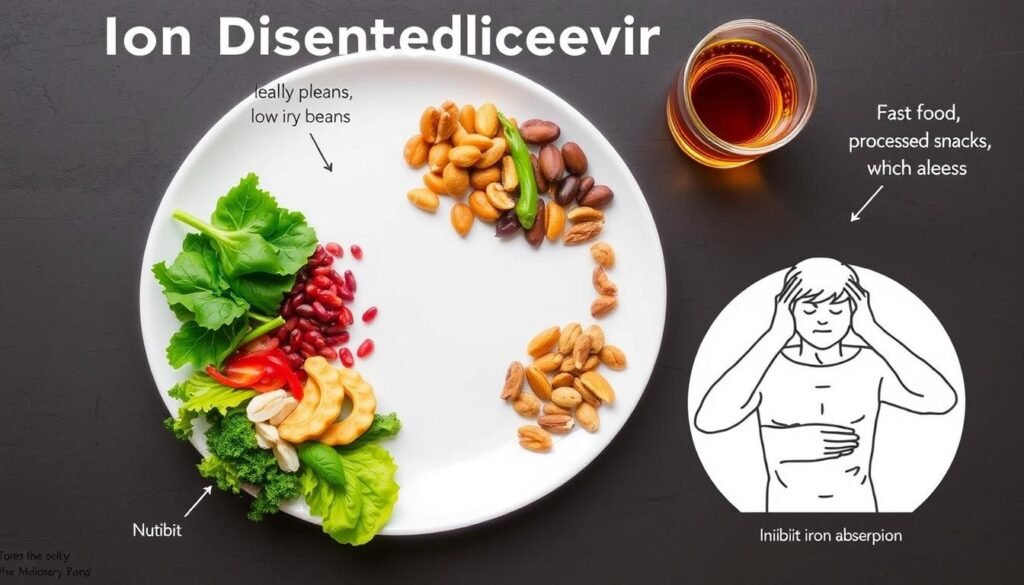About 40% of kids and 30% of women of childbearing age have anemia. Anemia may be behind the higher anxiety levels seen worldwide. There’s evidence linking low iron to mental health problems.
A lack of iron can cause physical symptoms. It can also make anxiety and depression worse. Knowing if low iron causes anxiety is important. Managing iron deficiency might improve mental health. This is especially true for those with symptoms of both.
Key Takeaways
- Around 40% of children and 30% of reproductive-age women experience anemia.
- Iron deficiency could worsen symptoms of anxiety and depression.
- Low ferritin levels may lead to increased risks of psychiatric disorders.
- Addressing iron deficiency might alleviate anxiety symptoms in affected individuals.
- Awareness and diagnosis of anemia are crucial for managing anxiety effectively.
Understanding Anemia and Its Symptoms
Anemia is when you don’t have enough red blood cells to carry oxygen well. This might be because of not eating right or health problems. Knowing the symptoms of anemia is important. It helps doctors find it early, especially since it can be confused with anxiety, which makes an anemia anxiety connection.
What is Anemia?
Anemia happens if there aren’t enough healthy red blood cells or hemoglobin. Hemoglobin is a protein that helps carry oxygen. One common type is iron-deficiency anemia, often caused by bad eating habits. Things that might make you more likely to get anemia include family history, kidney issues, heavy periods, and not getting enough important vitamins and minerals.
Common Symptoms of Anemia
The symptoms of anemia vary but are often hard to notice. Common symptoms include:
- Fatigue and weakness
- Pale skin
- Shortness of breath
- Rapid or irregular heartbeat
- Dizziness or lightheadedness
People with anemia may feel more anxious because of symptoms like fatigue and breathlessness. Knowing how these symptoms match up is key. Figuring out if it’s anemia or anxiety that’s the issue can help treat both better.
What Causes Iron Deficiency?
It’s crucial to understand what leads to iron deficiency to treat it effectively. This condition can cause several health problems, like anxiety. Knowing the root causes helps us find the right ways to handle iron deficiency anxiety.
Main Nutritional Deficiencies Contributing to Anemia
Poor nutritional intake is a big reason for iron deficiency, especially in underprivileged groups. The top nutritional deficiencies leading to anemia are:
- Iron: Essential for making hemoglobin.
- Vitamin B12: Important for making red blood cells. This is especially true for vegans, vegetarians, and people with stomach problems.
- Folate: Needed for DNA synthesis and repair. Many diets don’t have enough of this.
Other Potential Causes of Low Iron Levels
There are many other factors that can cause low iron levels. Some important ones include:
- Heavy menstrual bleeding: This is common in women of childbearing age.
- Gastrointestinal issues: Diseases like celiac or inflammatory bowel disease can block iron absorption.
- Chronic diseases: Conditions like kidney disease or cancer can lower iron levels.
Understanding these factors helps us get to the bottom of iron deficiency. It also guides how we treat people struggling with iron deficiency anxiety.

| Cause | Description |
|---|---|
| Poor Nutritional Intake | Lacks enough iron, vitamin B12, and folate. |
| Heavy Menstrual Bleeding | Leads to a significant loss of blood, lowering iron levels. |
| Gastrointestinal Issues | Conditions that block iron absorption increase the risk of deficiency. |
| Chronic Diseases | Illnesses that affect how much iron your body can store and use. |
Can Low Iron Cause Anxiety?
Research shows a connection between low iron levels and feeling more anxious. When someone doesn’t have enough iron, they might be more likely to feel anxious. This happens because the brain gets less oxygen, which can affect our mood and thinking.
People with low iron, especially if they have iron deficiency anemia (IDA), often experience anxiety more. Studies found that people with IDA were 1.52 times more at risk for psychiatric disorders. This shows how crucial it is to consider iron levels when looking at emotional health.
Taking iron supplements could lower the chance of psychiatric problems in IDA patients. People who took iron felt less anxious than those who didn’t. This suggests that fixing iron deficiency is good for both the body and the mind.
The Relationship Between Iron Deficiency and Mental Health
The link between iron deficiency and mental health is getting a lot of focus. Many people with low iron levels report feeling anxious. This has sparked interest in how iron impacts the brain. Knowing more about this can help us find better treatments.
How Low Iron Levels Affect Brain Function
Iron is vital for the brain, helping with thoughts and neurotransmitter production. Low iron can mess up neurotransmitter signals. This might cause mood swings and trouble thinking. Studies show that low iron can make people feel tired, anxious, and irritable. This is due to effects on brain energy and neurotransmitter creation.
Research Findings Linking Iron Deficiency to Anxiety
Research links iron deficiency to mental health issues, mainly anxiety and depression. A study in 2020 found that people with low iron have a higher anxiety risk. Stress can make this worse, leading to lower iron levels. It’s key for those affected to seek help from professionals.

| Condition | Impact |
|---|---|
| Low Iron Levels | Impaired cognitive function, mood alterations |
| Anxiety | Increased emotional distress, difficulty concentrating |
| Chronic Stress | Worsened nutritional deficiencies |
| Iron-Deficiency Anemia | Fatigue, weakness, and heightened anxiety symptoms |
Understanding the iron deficiency and mental health connection can improve treatment. Better diets and expert advice can help. If you’re worried about anxiety, try this self-assessment quiz for insight.
Iron Deficiency Anxiety Symptoms
Iron deficiency can greatly affect your mental health, leading to anxiety. Knowing the relationship between iron deficiency anxiety symptoms and mental issues is key. Anemia and anxiety share similar signs, which can be confusing.
Overlap Between Anemia and Anxiety Symptoms
Anxiety and anemia symptoms are often the same. Signs like fatigue, mood changes, and feeling on edge may be due to low iron. This overlap can worsen both anxiety and depression.
Spotting the overlap helps in treating it better. A simple blood test can show if you have low iron. Getting the right nutrients can improve your symptoms. To learn more, visit this source.
Physical Symptoms That May Induce Anxiety
Iron deficiency can cause physical issues that increase anxiety. Symptoms like rapid heartbeat, feeling dizzy, and breathing problems can occur. These issues can cause severe panic or anxiety attacks.
Understanding these signs helps in managing anxiety better. It prompts the need to treat iron deficiency as well. This approach stresses the importance of thorough testing for anxiety symptoms.

Diagnosing Iron Deficiency and Anemia
Understanding a person’s health starts with diagnosing anemia and iron deficiency. Providers use blood tests to check iron and red blood cell levels. They do this to figure out why someone feels tired or moody from low iron.
Blood Tests Used for Diagnosis
Doctors rely on a few key blood tests to find anemia and iron issues. They include:
- Complete Blood Count (CBC): It measures red blood cell count, hemoglobin, and hematocrit to detect anemia.
- Iron Panel: This checks serum iron, ferritin, and transferrin levels to gauge iron stores.
- Reticulocyte Count: It counts young red blood cells, showing new RBC production.
Conducting a Comprehensive Assessment
A full assessment is crucial beyond just blood tests for diagnosing anemia. It combines looking at medical history, diet, and specific symptoms like fatigue. Lifestyle and mental health questionnaires can help too. All these steps help create a personalized treatment plan.
Treating Iron Deficiency to Alleviate Anxiety
Treating iron deficiency is very important for your health. It can also help reduce anxiety. A plan that includes diet changes and supplements can bring back normal iron levels. This can make mental health better.
Dietary Changes for Improving Iron Levels
Eating certain foods can boost iron levels well. Going for iron-rich foods is a natural way to fight anxiety symptoms. Here are some foods to include:
- Leafy greens such as spinach and kale
- Legumes like lentils and chickpeas
- Red meats and poultry, which are great sources of heme iron
- Fish and shellfish, which offer iron and omega-3 fatty acids
- Fortified cereals that add a lot of iron to your breakfast
Eating right for iron deficiency helps increase energy and reduces fatigue from anxiety.
Iron Supplements for Anxiety Relief
For those who can’t get enough iron from food, supplements are a good choice. Studies show they can ease cognitive and emotional issues from lack of iron, like anxiety. Talk to a doctor to find out the best supplements to take safely.
When using iron supplements, it’s important to keep an eye on the amount and any side effects. Using both iron supplements for anxiety relief and making diet changes can greatly improve your health.
| Food Source | Iron Content (mg per serving) | Type of Iron |
|---|---|---|
| Spinach (cooked, 1 cup) | 6.43 | Non-Heme |
| Lentils (cooked, 1 cup) | 6.59 | Non-Heme |
| Beef (3 oz) | 2.1 | Heme |
| Chicken (3 oz) | 1.3 | Heme |
| Fortified Cereal (1 cup) | 18.0 | Varies |
Combining good food with the right supplements can help fight anxiety from iron deficiency. For more help, check out natural remedies and methods too.
Preventive Measures Against Iron Deficiency
Keeping healthy means stopping iron deficiency in its tracks. It’s important to eat well to keep iron levels up. By choosing iron-rich foods and knowing what increases risk, you can avoid anemia.
Importance of a Balanced Diet
Eating foods full of iron is key to prevention. Enjoy red meat, legumes, dark greens, and cereals with extra iron. Add vitamin C to your meals to help your body use the iron better. Making smart food choices also supports your brain health and can keep anxiety at bay.
Monitoring Risk Factors for Anemia
Watch out for signs that your iron might be low. If you’re a woman who has heavy periods or you’re very active, pay extra attention. Notice if you have symptoms like feeling very tired or having stomach troubles. If so, get checked for iron deficiency.
This forward-looking step helps prevent iron shortage and manage mental health better. To learn more about iron’s impact on your mood, check out this source.
| Food Sources | Iron Content (mg) | Additional Nutrients |
|---|---|---|
| Red Meat | 2.1 – 3.0 | Protein, Zinc |
| Legumes (Lentils, Beans) | 3.3 – 6.5 | Fiber, Folate |
| Dark Leafy Greens (Spinach, Kale) | 2.5 – 3.6 | Calcium, Vitamin K |
| Fortified Cereals | 10.0 – 18.0 | Vitamins B6, B12 |
Conclusion
A clear link between anxiety and not having enough iron has been found. This tells us how key nutrition is in handling mental health. Studies show that many women in the U.S. don’t get enough iron. This points to the need for better awareness and steps to take action.
Low iron can lead to anxiety. Knowing this helps people manage their health better. It’s crucial, especially for women and girls, to focus on eating better and getting the right treatment. These steps can improve both mind and body by boosting iron levels and managing anxiety through good nutrition.
Experts are still figuring out the best way to diagnose iron deficiency. Yet, it’s important for everyone to pay attention to their health. Regular check-ups can catch issues early, helping avoid mental health problems related to low iron.